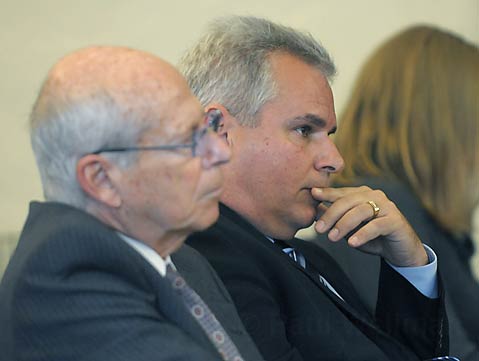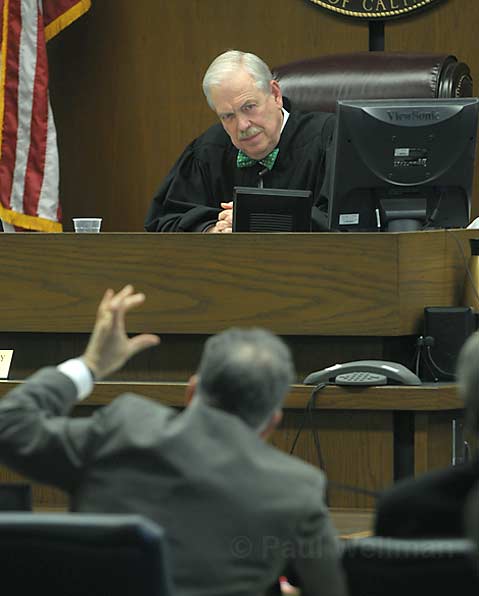Pappas on Hook for Farr’s Legal Fees
Supreme Court Overturns Previous Ruling After Landmark Case

In a somewhat surprising decision that aligns with a new opinion recently rendered by the California Supreme Court, an appellate court said Tuesday that Doreen Farr is entitled to recoup attorney’s fees from Steve Pappas, who had sued her in order to dispute the results of the 2008 election for 3rd District Supervisor. The same court in October had denied an appeal from Pappas contesting the election. The decision means Farr will at least get back a good chunk of the money she paid to defend herself against the suit from Pappas. Originally, Farr wasn’t terribly optimistic the appellate court would agree with her argument, but the ruling (which was actually issued past the court-mandated 90-day deadline) came as an early Christmas gift.

At the Superior Court level in 2009, Judge William McLafferty found Farr met two out of the three necessary conditions to be awarded attorney’s fees under the Code of Civil Procedure, but failed to meet the requirements of the last — that her action imposed a financial burden that was out of proportion to her personal stake in the outcome. McLafferty (who has since passed away) noted at the time that Farr’s campaign raised money that exceeded the annual salary and attorney’s fees in the case, and that “[c]learly the value of the office of Third District Supervisor is not the annual salary. Public office involves non-pecuniary interests of the office holder and his/her supporters that the court must consider in this context.” In denying Farr, McLafferty relied on a history of cases where the court considered nonmonetary interests.
However, the state Supreme Court — in the midst of Farr’s appeal — made a ruling in another case saying that the court may not use a person’s nonmonetary interests to disqualify him or her from recovering attorney’s fees. Instead, the state’s highest court said in Conservatorship of Whitley that courts must look at the financial burdens and incentives in bringing the lawsuit. Based on that opinion, the Court of Appeal weighed Farr’s personal financial benefit — she makes $84,500 a year while her attorney’s fees are in excess of $250,000 — with the cost of litigation and found that, as a matter of law, she is entitled to attorney’s fees.
Now it will be up to a Superior Court judge to determine how much Farr is entitled to. Pappas still has the option of appealing the three-person appellate panel’s decision to the state Supreme Court, but given that the appellate court relied heavily on the Supreme Court’s recent opinion, he would be hard pressed to come away victorious. Pappas didn’t return a phone call, and his voice mail directs calls regarding the suit to his attorney, Stanley Green. Green hadn’t heard about the decision when The Independent phoned him Tuesday afternoon, but said the opinion is “obviously a disappointment.”

Green said that while he knew Whitley was in the pipeline, he “felt there were still a number of issues.” He said it would be premature to talk about appealing the case to the state Supreme Court, considering he hadn’t read the opinion or had the chance to speak with his client.
The decision comes almost exactly two years after Pappas filed suit shortly after the 2008 election, which Farr won by 806 votes out of 35,524 total. Because of the way the Election Code is arranged, Pappas filed suit against Farr, though Pappas wasn’t alleging any misconduct by Farr.
Instead, he contested the inclusion of thousands of ballots in 18 precincts in and around UCSB, where Pappas lost by substantial margins. He argued that a number of voter registration cards violated the Election Code on a variety of technicalities — from the fact that completed cards weren’t returned to the Elections office within three days, to a failure by people who worked in registration drives to sign affidavits.
Despite the allegations from Pappas of “massive fraud,” Farr argued for, and won, McLafferty’s support by saying that not including the votes because of technicalities — especially when it wasn’t at the fault of the voters — wasn’t the intention of the law. The court, after a four-day trial, said that “Pappas has failed to produce evidence of even one isolated incident of fraud or other illegal voting.” Pappas appealed the decision, and the Court of Appeals denied that appeal in October.
The combined decisions have obvious ramifications when it comes to the battle for the swing seat of the 3rd District. Farr would’ve started off her reelection campaign — should she choose to run — in a deep hole if she had not been able to recover the fees. The rulings also allow the left to ardently defend the seat, always a hard-fought position on the Board of Supervisors. While many expect her to run again, and face opposition from the right, Farr said she wasn’t quite ready to talk about possible reelection in 2012, but was excited to be able to lay her head down at night for the first time in two years without a legal decision weighing over her. “I’m quite elated,” she said.



